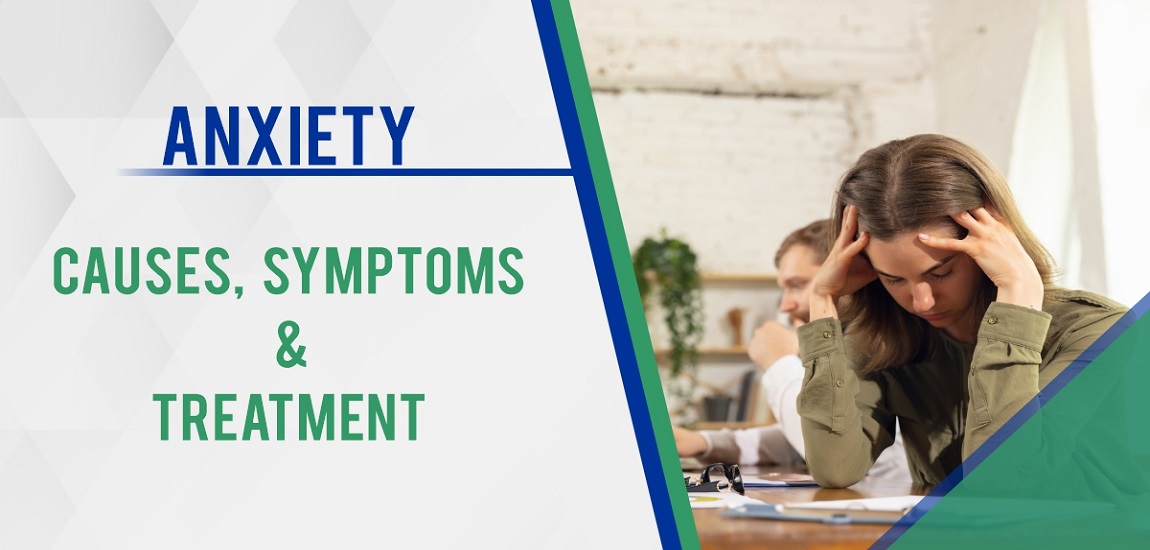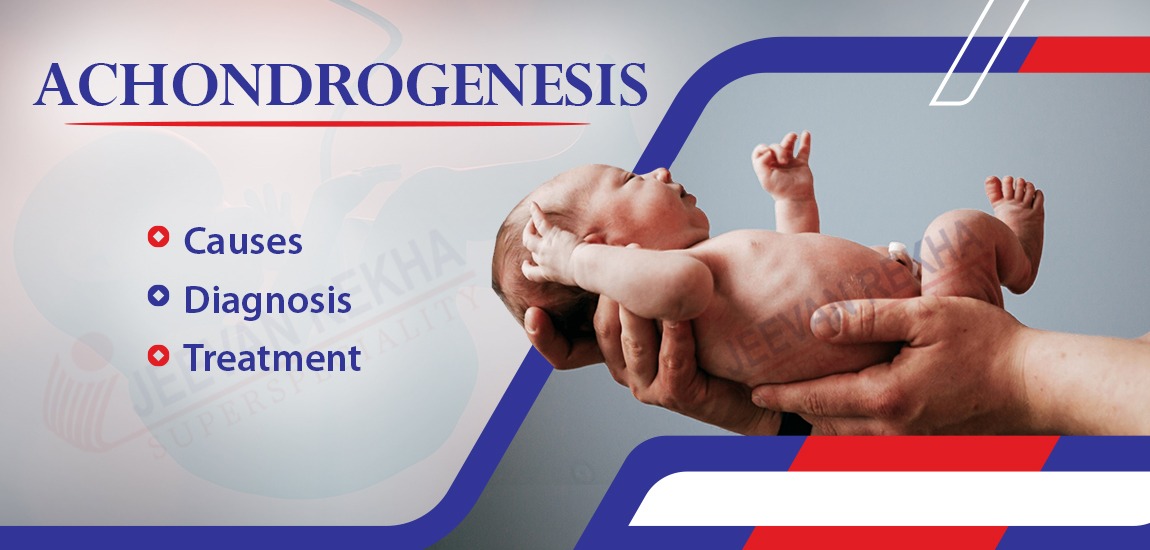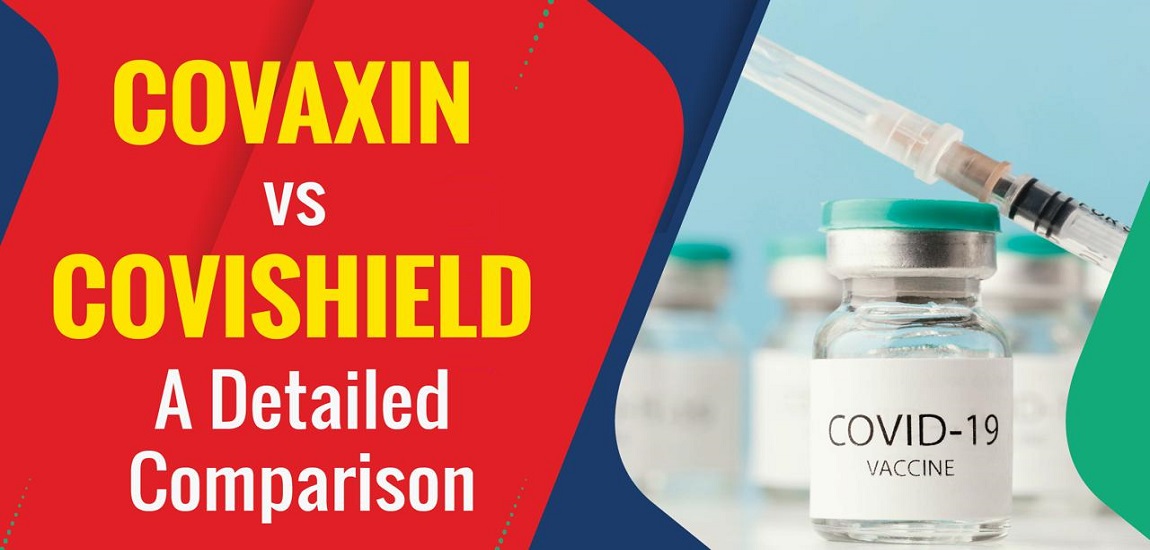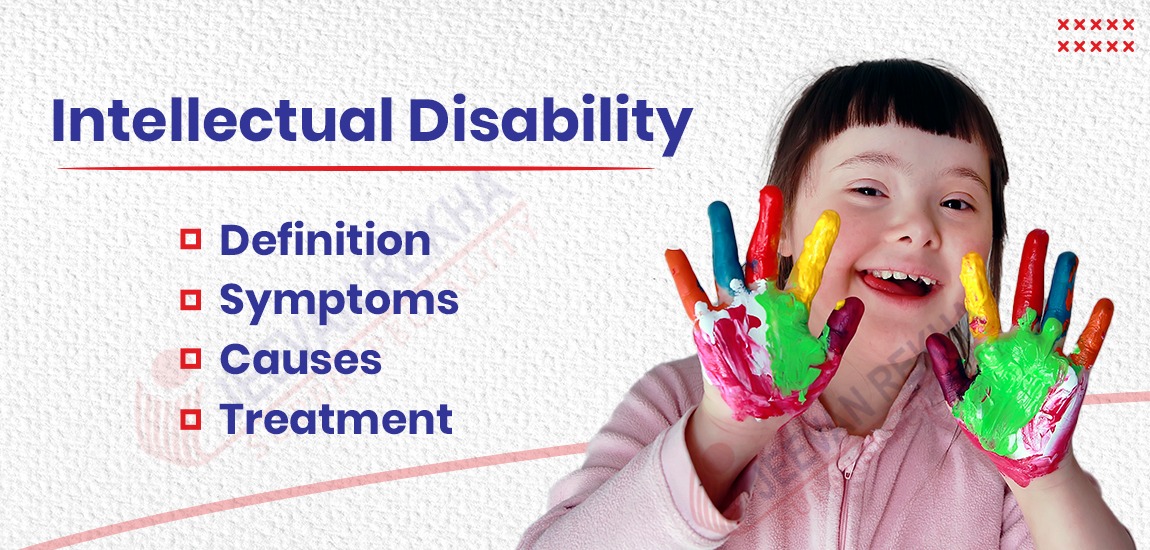
- By JRSH Admin
- In Health and Tips,
- Posted April 13, 2022
Anxiety: Causes, Symptoms, and Treatment
What are anxiety disorders?
Mental health conditions such as anxiety disorders are common. People with anxiety disorders may react with fear and dread to certain situations and things. As well as physical symptoms such as heart palpitations and sweating, anxiety can also manifest itself physically.
It's normal to feel anxious sometimes. If you are facing an issue at work, attending an interview, taking a test, or making an important decision, you may feel anxious or nervous. Anxiety is even beneficial in some situations. Our awareness of dangerous situations and focused attention help us stay safe when we are anxious.
An anxiety disorder, however, is far more profound than the ordinary nervousness and slight fear we all experience from time to time. An anxiety disorder usually manifests as:
- When you suffer from anxiety, you find it difficult to function.
- When your emotions are triggered, you often overreact.
- Changing your response to a situation is impossible.
It can be difficult to get through a day when you suffer from anxiety disorders. Treatment is available for anxiety disorders.
What are the types of anxiety disorders?
- Generalized anxiety disorder. You feel unreasonable worry and tension for no apparent reason.
- Panic disorder. This is a condition where you experience sudden, intense fear. A panic attack may cause you to break out in a sweat, have chest pains, and pounding heartbeats. There may be times when you feel like you have a heart attack or are choking.
- Social anxiety disorder. A social anxiety disorder is characterized by overwhelming worry and self-consciousness during everyday social situations. There's a constant fear of being judged, embarrassed, or ridiculed by others.
- Specific phobias. An object or situation causes you intense anxiety, such as heights or flying. Fear may make you avoid normal situations and go beyond what's appropriate.
- Agoraphobia. In case of an emergency, you are afraid of being trapped in a place where escaping or getting help is difficult. Having an anxiety attack on an airplane, on public transportation, or standing in line with a lot of people may make you feel panicky or anxious.
- Separation anxiety. A loved one leaving can be frightening or upsetting to anyone, not just little kids. Separation anxiety can affect anyone at any age. Your anxiety or fear will increase when someone close to you leaves your sight. You will always be worried that something bad will happen.
- Selective mutism. In a social anxiety disorder such as this, a child who regularly speaks with their family won't talk in public, such as at school.
- Medication-induced anxiety disorder. The use of certain pharmaceuticals or illegal substances, as well as.
What are the symptoms of anxiety?
Each person experiences anxiety differently. You could feel anything from butterflies in your stomach to a pounding heart. It may feel like your mind and body are disconnected.
In addition to nightmares, panic attacks, and memories that are painful or difficult to control, people with anxiety may also experience nightmares. The fear and worry you may experience may be general, or it may be specific to a particular location or event.
A general anxiety disorder may include the following symptoms:
- Rapid heartbeat
- Instinctive breathing
- Getting restless
- Concentration difficulties
- Sleeping problems
There are many ways anxiety can manifest, which is why it's important to know all of them.
What is an anxiety attack?
Panic attacks, which are also known as anxiety attacks, occur when a person experiences severe fear or panic. Most often, they take place without warning. In some cases, the attacks are provoked by an obvious event or thought-being stuck in your elevator, for example, or having to give a big speech-but in other cases, they happen without warning.
Attacks of anxiety typically peak within 10 minutes, and they usually last for no longer than 30 minutes. You may experience such intense terror during this brief period that you feel as if you may lose control. Many people believe that they are having a heart attack based on the physical symptoms. Having once suffered an anxiety attack, you may be concerned about experiencing another, particularly when in a public place without help or unable to easily escape.
What causes anxiety?
Anxiety disorders have not yet been fully explained. People who are prone to anxiety disorders seem to be more likely to become anxious when they experience traumatic events in life. Inheritance is also a contributing factor.
Some people may experience anxiety due to underlying health problems. Anxiety symptoms can act as the first indicator of a medical condition. Our doctor may order tests to look for signs of a problem if he or she suspects that your anxiety may have a medical cause.
Anxiety can lead to a variety of medical problems, such as:
- Heart disease
- Diabetes
- Thyroid problems, such as hyperthyroidism
- Respiratory disorders, such as COPD and asthma
- Drug misuse or withdrawal
- Alcoholics, people on anxiety medications (benzodiazepines), or others who are on withdrawal
- Irritable bowel syndrome or chronic pain
- Tumors that produce certain hormones are associated with the fight-or-flight.
Certain medications can sometimes cause anxiety as a side effect.
- Anxiety disorders are not in your bloodline (such as a parent or sibling)
- As a child, you did not suffer from anxiety disorders
- Anxiety does not cause you to avoid certain things or situations
- Unrelated to life events, you experience sudden anxiety that doesn't seem to be related to the past
Are there tests that diagnose anxiety?
If your anxiety is affecting your physical health, you may want to see your primary care provider. If there is a medical condition underlying the symptoms, he or she can help you diagnose it and treat it if necessary.
If you suffer from severe anxiety, you may need to see a mental health specialist. Medical doctors specializing in mental health diagnose and treat patients as psychiatrists. Some mental health professionals, such as psychologists, can diagnose anxiety and provide counseling (psychotherapy).
Your mental health provider may do the following to diagnose anxiety disorder:
- Give you a psychological evaluation. During this process, we discuss your thoughts, feelings, and behavior to pinpoint a diagnosis and look for related complications. A diagnosis of anxiety disorders can often be complicated by the presence of other mental health conditions - such as depression or substance abuse.
- Examine your symptoms in light of the DSM-5 criteria. This is the diagnostic method often used by mental health professionals to determine if you have an anxiety disorder.
What are treatments for anxiety?
Psychotherapy and medication can both be used to treat anxiety disorders. A combination of the two is likely to provide the best results. To discover which treatment works best for you, you may have to try and try again.
Psychotherapy
Psychotherapy, or talk therapy, is an intervention that is used to reduce anxiety symptoms by working with a therapist. Talk therapy has been shown to relieve anxiety symptoms.
Psychotherapy for anxiety disorders most often involves cognitive-behavioral therapy (CBT). An anxiety treatment that is generally short-term, cognitive behavioral therapy teaches you to improve your symptoms and gradually return to activities you avoided while suffering from anxiety.
A central component of cognitive behavior therapy is exposure therapy, in which you gradually confront the object or situation that triggers your anxiety, building confidence in your ability to deal with the situation and anxiety symptoms.
Medications
In addition to medication, other health issues and mental health conditions can also affect the effectiveness of medications. For example:
- Anxiety disorders can also be treated with certain antidepressants.
- You may be prescribed buspirone as an anxiety medication.
- Some doctors may prescribe other types of medications, such as benzodiazepines or beta-blockers, in limited circumstances. They are intended for short-term relief of anxiety symptoms and are not intended to be used for long periods.
What natural remedies are used for anxiety?
Stay active
Regular exercise can help you in more ways than one. You can also benefit mentally from regular exercise. People with anxiety disorders who report being physically active seem to be better protected against developing severe anxiety symptoms, according to a 2013 study.
Steer clear of alcohol
It's natural for alcohol to reduce anxiety because it's a sedative. In contrast, research indicates that alcohol consumption and anxiety disorders are linked, with anxiety disorders and alcohol use disorders (AUD) occurring together.
Consider quitting smoking cigarettes
During stressful times, smokers tend to reach for their cigarettes. As with drinking alcohol, taking a cigarette when you're stressed is a quick fix that may worsen anxiety over time.
According to research, the earlier you begin smoking, the higher your risk of having an anxiety disorder as an adult.
Limit caffeine intake
Caffeine is not your friend if you suffer from chronic anxiety. Caffeine may make you feel nervous or jittery, which isn't good if you're anxious.
Anxiety disorders may be exacerbated or caused by caffeine. Those with panic disorders may also suffer panic attacks when they consume caffeine. People with anxiety symptoms may benefit greatly from eliminating caffeine.
Prioritize getting a good night’s rest
The importance of sleep for good mental health has been demonstrated over and over again. Despite a 2012 survey finding that nearly a third of adults get less than six hours of sleep per night, the Centers for Disease Control recommend that adults get seven to nine hours of sleep daily.
Meditate and practice mindfulness
In meditation, observing all thoughts in a nonjudgmental manner is one of the main goals. Increasing your capacity to tolerate all thoughts and feelings can lead to a sense of calm and contentment. Stress and anxiety can be relieved through meditation and is a major component of CBT.
Eat a balanced diet
People experiencing mood changes may be affected by low blood sugar levels, dehydration, or chemical ingredients in processed foods, such as artificial flavorings, colorings, and preservatives. Temperament may also be affected by a high-sugar diet.
You may need to adjust your eating habits if your anxiety increases after eating. Keeping hydrated is important, as is eating a balanced diet that includes complex carbohydrates, fruits and vegetables, and lean proteins.
Practice deep breathing
With anxiety, you tend to breathe shallowly and fast. Diagnosing this condition may also cause dizziness, lightheadedness, or a panic attack.
It is possible to restore normal breathing patterns and reduce anxiety through deep breathing exercises - the deliberate act of taking slow, even breaths.
Try aromatherapy
Humans have used aromatherapy for thousands of years as a holistic healing treatment. By combining natural plant extracts and essential oils, this practice promotes physical, mental, and emotional health. The practice aims to improve physical, mental, and emotional wellbeing.
It is possible to inhale the essential oils created by natural plant extracts by adding them to warm baths and diffusers.
Drink chamomile tea
It is commonly used as a home remedy to soothe frayed nerves and promote sleep.
According to a 2014 study, chamomile is an effective treatment for generalized anxiety disorder. The researchers found that people taking German chamomile capsules (220 milligrams up to five times daily) experienced greater reductions in test scores that measure anxiety symptoms than those taking a placebo.
How to help children with anxiety?
- Help your child recognize when they are experiencing anxiety
- If your child experiences anxiety, encourage them to seek help when needed
- Keeping routines is comforting to kids of all ages, so try to stick to them whenever you can
- Look for books or films that will help your child understand their feelings after a distressing event, such as a bereavement or separation
- When a change is coming, such as a move, talk to your child about what is going to happen and why.
- Keep your anxiety and overprotectiveness in check
- Simple relaxation techniques can be taught to your child, such as taking three deep, slow breaths and counting on your threes as you breathe in and out.
- Young children benefit from distractions. Play some games on the way to the nursery if they are anxious about going there. For example, see who can spot the reddest cars as you travel.
Anxiety and stress
- Anxiety and stress are both parts of the body's natural response to danger and stress. Stress hormones are released when someone feels threatened.
- Heart beats faster when exposed to stress hormones, pumping more blood to organs and limbs.
- Having such a reaction prepares a person to either fight or run away. It also makes their breathing faster while their blood pressure goes up.
- As well as sharpening the senses, a person's body releases nutrients for energy to all the parts so that all parts are well supplied.
- Stress occurs rapidly during this process. When stress occurs in the body, anxiety is the result.
- Anxiety has long been recognized as a feeling of distress, anxiety, or dread that someone experiences before a significant event. This maintains alertness and awareness.
- When someone faces a physical, emotional, or perceived threat, they may trigger the fight or flight response. For some people, it can interfere with their daily lives, even though it can be useful.
Anxiety and alcohol
Those who drink heavily over an extended period may develop anxiety disorders. However, moderate drinking does not appear to cause anxiety.
Alcohol withdrawal is also associated with increased anxiety. When you stop drinking after consuming alcohol in large amounts for a long time, the side effects of alcohol withdrawal can exacerbate your anxiety. Alcohol withdrawal symptoms also include:
- trembling hands
- sweating
- heart rate above 100 beats per minute
- hallucinations
- nausea
- vomiting
- seizures
Drinking alcohol may sometimes have benefits that are outweighed by risks, which include:
- depression
- obesity
- liver disease
- cardiovascular damage
Can foods treat anxiety?
You may also be able to eat foods that promote brain health and reduce your symptoms, most of which are brain-boosting in nature. Such as:
- Chamomile
- Turmeric
- Dark chocolate
- Yogurt
- Green tea
Tags
Blog Search
Latest Posts
-
बर्ड फ्लू के लक्षण, कारण, उपचार और बचाव के उपाय जानें
December 04, 2025 -
Best Diet Plan for Menopause Weight Management
November 25, 2025 -
Pulmonary Fibrosis Treatment: Understanding Lung Scarring and Breathing Problems
November 21, 2025 -
Arrhythmia: Types, Causes, Symptoms, and Treatment
November 07, 2025 -
Silent Heart Attack: Causes, Symptoms and Treatment
October 24, 2025




